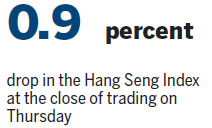H-share falls pare best month's gains
Updated: 2015-05-01 07:32
By Bloomberg(HK Edition)
|
|||||||||
Mainland stocks trading in Hong Kong fell for a third day on Thursday, with raw-material companies sliding before Friday's manufacturing data, and Industrial and Commercial Bank of China Ltd (ICBC) slumping after reporting weak profit growth.
Jiangxi Copper Co plunged 2.3 percent. ICBC, the biggest lender, declined 1.9 percent after posting the lowest first-quarter earnings growth since listing in 2006. Official manufacturing data will probably show a reading of 50 in April, down from the previous month's 50.1, according to economists surveyed by Bloomberg.
The Shanghai property index surged to a record high after the nation's leading economic planner said it saw positive signs in the property market.
The Hang Seng China Enterprises Index in Hong Kong slid for a third day, losing 1.2 percent to 14,431.11 at the close. The H-shares gauge climbed 17 percent this month, capping the best month since October 2011. The Shanghai Composite Index fell 0.8 percent, dragged down by energy and metal shares and paring gains in April to 19 percent.
"The A-share bull run will likely weaken going forward," Morgan Stanley strategist Jonathan Garner wrote in a report. "Valuations are climbing higher, while earnings are drifting lower."
The H-shares gauge has risen 36 percent in the past six months, lagging the Shanghai gauge's 86-percent advance. The Hong Kong measure trades at 10.4 times reported profit, versus the five-year average of 9.5. The Shanghai index trades at a multiple of 22, a 65 percent premium to the five-year average. The mainland measure has risen the most among benchmark indexes globally during that period amid speculation the central bank will further loosen monetary policy to bolster the economy.
The Shanghai index rose 1.1 percent this holiday-shortened week even as the nation's securities regulator warned about market risk. New stock investors, especially smaller traders, are overlooking the risk of losses and should be more rational, the China Securities Regulatory Commission (CSRC) said earlier in the week.
"The regulators want to see a steady slow bull market," said Zhang Qi, a Shanghai-based analyst at Haitong Securities Co Ltd. "It's likely that the CSRC may take some measures to prevent the market from overheating."
The CSI 300 Index slid 0.5 percent on Thursday, while the Hang Seng Index slumped 0.9 percent. Mainland and Hong Kong financial markets will be shut on Friday for the Labor Day holidays.
Gauges of energy and material shares in the CSI 300 slid at least 1.8 percent for the steepest losses among industry groups. Aluminum Corp of China Ltd dropped 5 percent in Shanghai, while China Oilfield Services Ltd retreated 2.9 percent after reporting a 31 percent drop in first-quarter net income. Anhui Conch Cement Co fell 0.8 percent in Hong Kong.
ICBC slid 2.2 percent in Shanghai after it said net income climbed 1.4 percent to 74.3 billion yuan ($12 billion) in the three months ended March 31. The mainland's big five banks are at risk of their weakest full-year profit growth since at least 2004 after first-quarter results showed bad loans rising in a struggling economy.
Last week, HSBC Holdings Plc and Markit Economics reported that their preliminary Purchasing Managers' Index for mainland manufacturing slid to 49.2 for April - the second month below the 50 level that signals contraction. The government is also scheduled to release services data on Friday.
The rally for A shares will also fade because of rising share supply, slowing leverage growth, increasing exchange-traded fund redemptions and technical indicators signaling overbought conditions, Morgan Stanley strategists led by Garner wrote in the report dated April 29.
A gauge of property developers in Shanghai jumped 6 percent to the highest level since May 1993. Poly Real Estate Group Co Ltd surged 6.9 percent, while Gemdale Corp added 3.8 percent.
The mainland's real estate sector is showing positive signs after the government took measures to stabilize the market, the National Development and Reform Commission said in a statement on first-quarter fixed-asset investment. Measures taken in the past two months included cuts in lenders' reserve-requirement ratios and lower down-payment requirements for purchases of second homes.

(HK Edition 05/01/2015 page6)